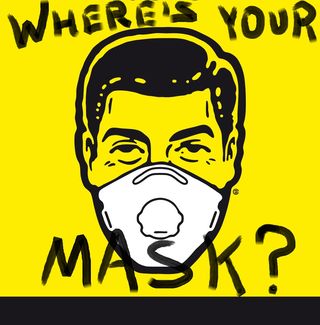Fear
Fear: Lifesaver or Manipulator
Fear is a powerful emotion that can be used for or against us.
Posted April 13, 2020 Reviewed by Lybi Ma
I was shocked to see that I had to walk through a maze of stacked pallets in order to enter the store. Then I saw a man spraying the shopping carts with some chemical, and I felt a chill run down my spine. Once I got inside, I noticed that almost everyone was wearing surgical masks and rubber gloves. It was really creepy, and I felt like I was naked. Some of the people wore pins that read: Stay Back Six Feet, Thank you. I saw others that read: Keep Away from Me by 6 Feet. I noticed that people were avoiding eye contact and some even averted their faces when I looked toward them. I wondered if it was because I wasn’t wearing a mask and gloves. At one point, I cleared my throat and a woman near me jumped away.

The sight of all those masks and gloves was making me afraid. I found that I was only taking shallow breaths in the hopes that I wasn’t inhaling contaminants. I imagined toxic germs on every surface. I was scared to touch anything with my bare hands, and only selected goods that were further back on the shelves where hopefully no one had touched them. I hurried through the store, worked only from my list, looked at nothing extra, and left within minutes. In my car, I slathered my hands liberally with an alcohol-based sanitizer. On the drive home the radio blared warnings of virus deaths soaring, pandemic, body counts rising, hospitals overflowing, quarantine, essential business only, lockdown, worse than the plague, shelter-in-place, all parks and recreation areas closed. Stay Home.
When I got home I sprayed all my purchases with Lysol disinfectant and wiped them down thoroughly. Once that was done, I relaxed and felt the anxiety that had been building up inside me subside... a little. Then I turned the TV onto a news channel and watched: New York City seems like a war zone, Central Park turned into an emergency hospital, refrigerated trucks are storing heaps of dead bodies, mass graves being dug by bulldozers, and nurses quitting their jobs because of mask shortages. I started to feel a paralyzing panic set in.
As I recognized the fear taking over my mind, I paused and remembered that I am the one who ultimately controls my emotions. I thought, “Wow, if I’m feeling this much fear, then it could be that I’m being manipulated. It’s time to see what’s true and what’s not.” I started doing some research and thinking critically.

Fear is our most powerful emotion and the one that motivates us the most. It is a survival mechanism, that dates back to our caveman days, an instinctual reaction that helps us stay healthy and alive. If we survive a bad experience, we never forget how to avoid it in the future. Some of our oldest and most vivid memories are born in fear. It’s adrenaline that etches them into our brains. Nothing makes us more uncomfortable than fear. And, we have so many fears: pain, disease, injury, loss, failure, abandonment, crime, and so on.
According to Clifford Nass, a professor of communication at Stanford University, “We get scared because of what we imagine could happen. Some neuroscientists claim that humans are the most fearful creatures on the planet because of our ability to learn, think, and create fear in our minds.” Once you have become frightened, everything seems scarier, and your fear response becomes amplified. It’s called potentiation when your fear becomes intensified and you react more powerfully. For example, if you are already afraid of snakes, and you see one, you might jump back and scream - even if it’s a harmless garter snake.
Fear invokes the flight or fight syndrome, and our first reaction is to flee back to our comfort zone. And, if we don’t know the way back, we are likely to follow whoever shows us a path. The nature of fear makes us manipulable.
I have heard the media referred to as Fear Porn. Media must sell advertising in order to stay in business; to sell advertising it must attract an audience; to attract an audience it must offer interesting news. The type of news that attracts the most people is negative, and negative news that inspires fear attracts the largest audience. This is because human beings tend to have what’s known as a Negativity Bias.
We are more likely to remember negative experiences over positive ones. We dwell and ruminate more over insults, criticism, failure, loss, and abandonment than we do our successes. Again, this dates back to the evolution of our caveman ancestors because those that paid attention to threats, risks, and other lethal dangers were those who survived and passed on their genes. Bad news warns us that we may need to make a change.
John Cacioppo, a psychology professor at the University of Chicago, conducted studies where participants were shown pictures of either positive, negative, or neutral images, he then observed electrical activity in the brain. He noticed that negative images produced a much stronger cerebral cortex response than did positive or neutral images.
It is our Negativity Bias that cues us to notice bad news. Media companies know this and use it to their advantage. There is an old saying in television news: “If it bleeds; it leads.” The more a story scares you, the more likely you are to watch it and follow it.
"The whole aim of practical politics is to keep the populace alarmed - and hence clamorous to be led to safety - by menacing it with an endless series of hobgoblins, all of them imaginary." H. L. Mencken
Fear not only sells more advertising, but it also gets more votes. Politicians, successful ones at least, also understand our negativity bias and will exploit it to gain power. Fear is also how our governments get us to acquiesce to laws that take away our freedom, such as the intrusive search we endure at airports by the TSA. Michael Crichton, in his book State of Fear, said, “Social control is best managed through fear.”
“He who has overcome his fears will truly be free.” Aristotle
The first step in dealing with fear is to recognize that you are afraid before you act upon it. Step back and identify the exact cause of your fear. Once you know that you can research whether or not it is based on fact. When you have isolated the facts, you will know if someone is trying to manipulate you or not, and you can act mindfully and rationally.




